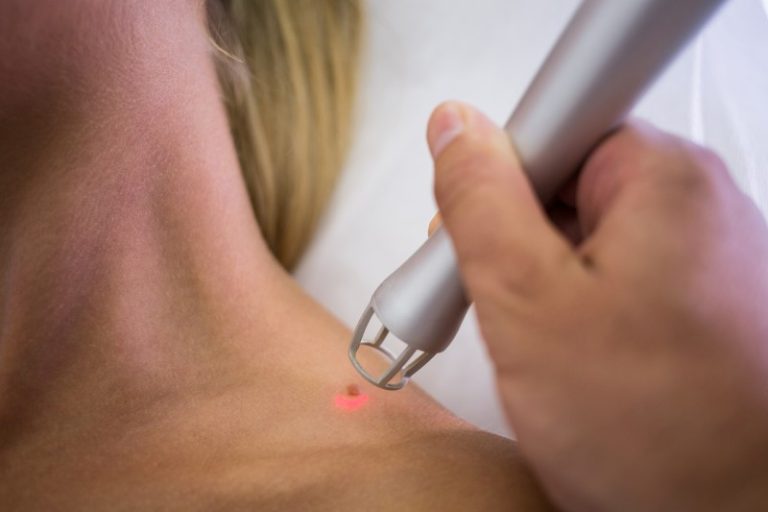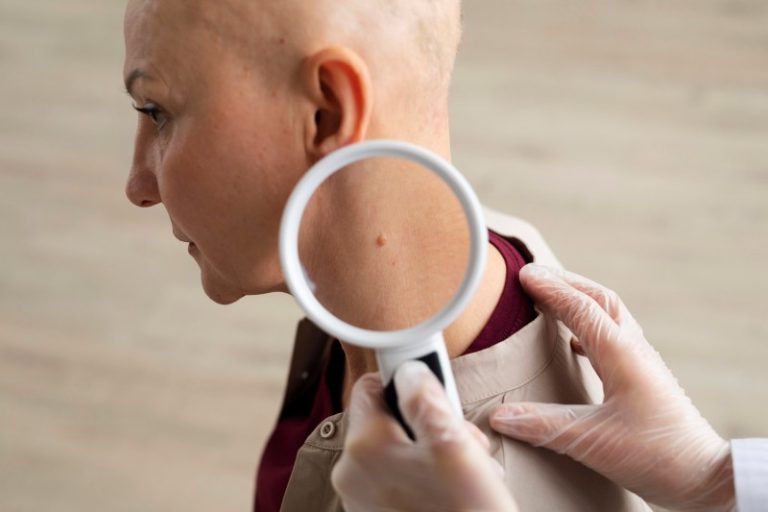Skin Tags Removal at Skinpase
What are Skin Tags?
Skin tags are tiny brown or flesh-colored growths that hang from the surface of your skin. They typically range in size from a few millimetres to five centimetres. They can resemble warts or elevated pimples and are formed of labile collagen fibres and blood vessels encircled by skin. Skin tags are equally likely to occur in men and women. Almost everywhere on the body covered by skin is susceptible to skin tags. However, the neck and underarms are the two places where skin tags appear most frequently. Skin tags are also found on the eyelids, chest area (especially under the female breasts), buttock folds, and groyne folds,
Skin tags are a common condition that are usually uncomfortable but completely harmless. They can leave you feeling less attractive and cause bleeding if they snatch up on your clothing or jewellery.
What Causes Skin Tags?
They most frequently afflict those who are overweight as they are more likely to develop them where the skin folds or creases (most frequently on the neck, armpits, around the groyne, or beneath the breasts). Skin tags can run in families, and type 2 diabetics and expectant mothers are both more likely to get them. They can also appear in some persons seemingly out of nowhere.
How skin tags are removed?
An experienced dermatologist will examine your skin tag during your consultation to identify the best course of action. They will be able to address any concerns you may have regarding your skin tag removal during your appointment and provide you with tailored guidance. They will be inclined to perform the procedure in-clinic if they assess that your skin tag can be removed.
Skin tag removal procedures include the following:
- Cauterization
- Cryotherapy
- Surgery
- Electrosurgery
- Ligation
- Laser treatment
The removal technique is determined by the type of lesion and carried out following the administration of topical anaesthesia.
Our team of doctors hears your skin problems and advise the optimised treatment plans for skin tag removal. If you need Keloid treatments, psoriasis treatment, acne, skin infections treatment or remedies for skin allergies, our medical dermatology team will help you through out the treatment processes.

With access to
24 Hour
Emergency
Assistance
A small river named Duden flows by their place and supplies it with the necessary regavelialia. It is a paradise.
Service Recipient Says

Oxmox advised her not to do so, because there were thousands of bad Commas, wild Question Marks and devious.
Lorem Ipsum is simply Lorem Ipsum is simply
Oxmox advised her not to do so, because there were thousands of bad Commas, wild Question Marks and devious.
Lorem Ipsum is simply Lorem Ipsum is simply
Frequently Asked Questions
Are skin tags dangerous?
Except in rare instances wherein they will create irritation due to friction or stuck on rings or apparel, they’re generally painless and do not pose a fitness hazard. However, if skin tag changes in appearance, together with bleeding, or a change in color or texture, you should get it checked out via a medical doctor. Those can be signs and symptoms of a extra critical skin condition. Additionally, it is an excellent idea to see a dermatologist to rule out any underlying fitness troubles when you have a whole lot of skin tags or if they seem in unusual locations, just like the eyelids
Can we remove skin tags?
Yes, a medical professional can safely and effectively facilitates in skin tags removal. For most of the time, skin tags are not harmful, however they may be removed for aesthetic motives or if they are causing pain or inflammation. The common methods for disposing of skin tags are:
1. Surgical elimination: Under anesthesia, the skin tag is eliminated with a scalpel or surgical scissors.
2. Cryotherapy: Using liquid nitrogen, the skin tag is frozen off.
3 Cauterization: Using warmth or electricity, the pores and skin tag is burned off.
It is critical to keep in mind that attempting to take away skin tag at home may results in infection, scarring, and different troubles. It is great to talk to a skin doctor in case you want to remove it
Does skin tag removal hurt?
The skin tag elimination treatment generally does no longer harm or causes a whole lot of discomfort. They can be removed in a lot of ways, along with slicing, freezing, and burning. The length, area, and method of elimination, in addition to the pain tolerance may also play a function.
For example, slicing a bigger pores and skin tag off may additionally require a sedative to numb the vicinity before expulsion. A brief sensation of pain may additionally occur when the skin tag is frozen or burned, however this typically is minimum and fleeting.
Will skin tags grow back after they are removed?
After skin tag elimination, there is a small danger that they may reappear, particularly if the underlying reason—irritation or friction—isn’t addressed. However, most of the time, skin tags do no longer develop back after they are removed. In order to avoid infection, it’s important to keep the removed place smooth and dry. A dermatologist must be consulted in case you observe a new skin tag growing in the identical place to rule out any underlying health problems.
Are skin tags contagious?
No, skin tags aren’t contagious. Skin tags are benign growths that don’t originate from viruses or micro organism and commonly develop as a result of friction or irritation. They aren’t infectious and aren’t a sign of any sickness or contamination. There is no danger in contracting skin tags if you touch or come into contact with them.
Can skin tags be prevented?
There isn’t any surefire method for preventing skin tags.However, you can decrease the risk of developing skin tags by doing the following:
- Maintain a healthy weight: Overweight can boom your hazard of growing pores and skin tags, mainly in regions where pores and skin rubs against skin.
2. Maintain a dry skin: Keeping your pores and skin dry can help save you skin tags, which are caused by moisture.
3. Avoid wearing tight dress: Skin tags can expand whilst tight apparel rubs against the skin and causes infection.
4. Take care of your underlying health troubles: Skin tags can be more likely to develop when you have diabetes or other underlying medical conditions. Taking care of these problems can help decrease your hazard.
Latest Blogs
Updated Blogs & News

















Oxmox advised her not to do so, because there were thousands of bad Commas, wild Question Marks and devious.
Lorem Ipsum is simply Lorem Ipsum is simply